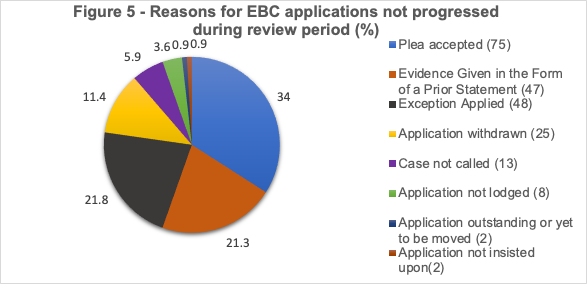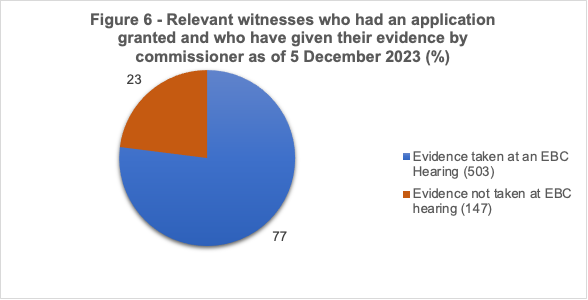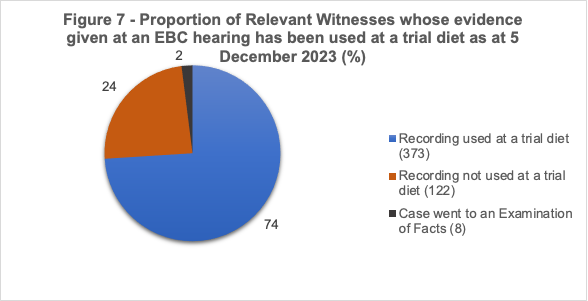Vulnerable Witnesses Act - section 9: report
This report meets obligations on Scottish Ministers by the Vulnerable Witnesses (Criminal Evidence) (Scotland) Act 2019 to publish a report evaluating the effectiveness of the Act at supporting witnesses to participate in the criminal justice system and to set out next steps for implementation.
6. Statistics on relevant witnesses
Background
The Act requires that this report includes specific data relating to the operation of the presumption since the start of the 3-year review period:
- the number of witnesses to whom the presumption in favour of pre-recording evidence applied during the review period (‘relevant witnesses’);
- the proportion of those witnesses that, by the time the report is prepared, have had their evidence taken by at an EBC hearing;
- the proportion of those witnesses who, having had their evidence taken at an EBC hearing, have, by the time report is prepared, had their evidence played at trial;
- the reason that the evidence of any relevant witness has not been taken by a commissioner despite a court having made an order authorising its being taken in that way; and
- the reason that the evidence of any relevant witness that was taken by a commissioner had not been used at a trial diet.
As the information required by the Act relates to the operational performance of a specific aspect of the criminal justice system, this data is not routinely collected by the Scottish Government. Accordingly, the Scottish Government has worked in close conjunction with SCTS and COPFS to capture and analyse the data required.
A detailed overview of the methodology setting out the process followed for collecting this data is set out in Chapter 10. SCTS and COPFS have gathered this data up to 5 December for the purposes of including in this report and ensuring that statistics informing our evaluation of the Act are as up-to-date as possible.
Analysis of the data collected can be found at Chapter 8.
Results of the data gathering exercise
This section of the Report provides an overview and analysis of the data gathered in meeting the reporting requirements on Scottish Ministers as set out in section 9(2)(a) – 2(d)(ii) of the Act.
Number of “relevant witnesses”
- 870 relevant witnesses were identified during the review period– that is witnesses under the age of 18 who were required to give evidence in relation to cases involving specified offences indicted to the High Court (“relevant witnesses”). This includes those relevant witnesses where specific applications under section 271BZA of the Criminal Procedure (Scotland) Act 1995 were made by COPFS and those that were made by defence counsel.
Number/proportion of relevant witnesses in respect of whom applications for EBC hearings were granted
- 650 of those 870 relevant witnesses, or 75%, received an order approving/granting a commission.

N= 870 relevant witnesses
Number/proportion of relevant witnesses in respect of whom applications for EBC hearings were not sought, not approved or not progressed
- 220 of those 870 relevant witnesses, or 25%, did not receive an order approving/granting a commission.
There are a number of reasons why an application for taking evidence by commissioner may not have been made or moved by the relevant party or granted by the Court.
The most common reason was that a plea was accepted by COPFS removing the need for an application to be considered by the Court. This occurred for 75, or 34%, of the 220 relevant witnesses who did not have an application for an EBC progressed or approved
Another common reason, accounting for 47, or 21%, of the 220 relevant witnesses who did not have an application for an EBC progressed or approved, was that applications were made to the Court for testimony given by those relevant witnesses in the form of a prior statement to be used as their whole evidence, without the need for them to be cross-examined or examined further. Thus those witnesses did not require an EBC hearing to take place.
A full list of the reasons why an application may not have been approved by the Court or progressed is provided at Figure 5 below:

N= 220 EBC hearing applications not approved/progressed
It is notable that in a significant number of instances, the reason that a relevant witness did not have an EBC application progressed or granted is because the case concluded or because no further evidence was required from that witness.
Number/proportion of relevant witnesses in respect of whom applications for EBC hearings were granted, that gave evidence at an EBC hearing
- 650 relevant witnesses had applications for EBC hearings granted by the Court.
- As of 6 December 2023, 503, or 77% of those 650 relevant witnesses in respect of whom orders for EBC hearings have been granted, have given their evidence at an EBC hearing.

N = 650 EBC hearing applications approved
Reasons why relevant witnesses in respect of whom orders for EBC hearings have been granted, have not had their evidence taken at an EBC hearing
The data collected shows that the most common reason for a previously granted EBC hearing not going ahead is that the witness/a party has failed to appear at the EBC hearing. This accounts for 35% of those cases in which an application has been granted by the Court but the EBC hearing has not gone ahead. On further examination, in each of these cases, it was the relevant witness that failed to attend.
Another key reason for an EBC hearing not proceeding despite an application being granted is where relevant witnesses are not required to give evidence at an EBC hearing because a plea has been tendered by the accused and accepted by COPFS.
| Reason why evidence not taken by Commissioner | Number of witnesses | Percentage (%) |
|---|---|---|
| The witness/ a party failed to appear at the EBC hearing so it did not proceed[9] | 51 | 35 |
| The case resolved by way of a guilty plea from at least one accused | 19 | 13 |
| Evidence no longer required | 11 | 7 |
| The EBC is no longer required | 23 | 16 |
| The indictment/case was deserted | 7 | 5 |
| The EBC hearing has not yet taken place | 3 | 2 |
| The witness disengaged during the EBC hearing | 0 | 0 |
| Other reason | 33 | 22 |
| Total | 147 | 100 |
The ‘other’ category encompasses a number different reasons why an EBC hearing may not have taken place despite an order having been made to take the evidence of a relevant witnesses on commission. Examples include, a party to the case’s solicitor withdrawing their representation, an inability for parties to a case to attend or due to ill health of a party involved in a case.
Number/proportion of relevant witnesses whose evidence given at an EBC hearing has been used at trial
- Of the 503 relevant witnesses whose evidence had been given at an EBC hearing, 373, or 74%, had a recording of that evidence played at trial by 6 December 2023. A further 8, or 2%, had their case progress to an Examination of Facts[10].
- The remaining 122, or 24%, have not had a recording of their evidence used/played at a trial diet.

N = 503 relevant witnesses whose evidence was taken at an EBC hearing
Reasons why relevant witnesses recorded evidence from EBC hearings has not been used/played at trial
Data shows that, by a considerable margin, the most common reason why recordings of evidence taken at EBC hearings have not been played at trial is because the trial has not yet taken place. This accounts for 49, or 40% of those recordings which have not been played at a trial diet.
The High Court has been significantly impacted by the Covid-19 pandemic and the additional pressures that this has placed on the criminal justice system. It is important to note that while the recording itself has not yet been played at trial, the involvement of the relevant witness in that trial has concluded. Had the evidence of these 49 witnesses not been taken on commission then they would still be waiting to provide their evidence.
Another reason identified, accounting for 23 relevant witnesses, is that he case was resolved by way of a guilty plea from at least one accused.
| Reason why evidence not played at Trial | Number of witnesses | Percentage (%) |
|---|---|---|
| The case was resolved by way of a guilty plea from at least one accused | 23 | 19 |
| The indictment/ case was deserted, including not called | 19 | 16 |
| The witness gave live evidence or live evidence in part at the trial instead of their EBC recording being played | 5 | 4 |
| The trial has not yet taken place[11] | 49 | 40 |
| Other reason | 26 | 21 |
| Total | 122 | 100 |
The ‘other’ category includes a variety of other reasons why the recording of an EBC hearing may not have been played at trial, many of which relate to prosecutorial discretion regarding what evidence they choose to lead in a case and how they decide to present that evidence at trial based on the specific characteristics of the case.
Three-month evaluation data
In addition to the data collected by SCTS and COPFS to meet the reporting requirements set out in section 9 of the Act, this report has also been informed by the findings of a short term evaluation of the presumption that was completed during the three year review period in accordance with the Implementation Plan. The evaluation was conducted over a three month period in the High Court between 20 September 2022 and 20 December 2022.
The core metrics underpinning the Review are set out in Annex 4. The results of the three-month evaluation have been published alongside this report http://www.gov.scot/ISBN/9781835217931
A significant finding that emerged from this review was that a significant proportion of all applications to take evidence by commissioner during the three month period were for adult vulnerable witnesses. Of the 261 applications in the High Court for evidence to be taken by commissioner, 121 or 46% were in relation to vulnerable adult witnesses, despite the fact that they are not covered by the presumption. The remaining 140 or 54% of applications made during this three month period were for child witnesses.

N = 261 applications for taking evidence by commissioner
A further significant finding of this evaluation was the frequency of adjournments of EBC hearings and the reasons for those adjournments. Data from the review demonstrated that the most common reason for adjournment of an EBC hearing was due to disengagement of the witness which accounted for 28 of the 62 EBC hearings that were adjourned on the day during this period, including those instances where the witness failed to attend the EBC hearing.

N = 62 EBC hearings adjourned on the day of the hearing
Contact
Email: prerecordedevidence@gov.scot
There is a problem
Thanks for your feedback